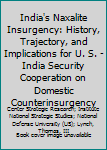India's Naxalite Insurgency: History, Trajectory, and Implications for U. S. -India Security Cooperation on Domestic Counterinsurgency
The pace of U.S.-India defense cooperation over the past decade-and especially the past 2 years-has been unprecedented and impressive in many areas. These areas include defense technology cooperation, the discussion of a framework for military-to-military agreements, and the expansion of joint military exercises. U.S.-India defense cooperation, however, will remain limited in critical areas where India's historical independent interests remain firm. Among these areas of Indian reserve include strategic autonomy, the imperatives of domestic federalism, and the preference for a go-slow approach toward redressing civil unrest. Attempts by U.S. policymakers to press harder in these areas will likely prove counterproductive. India's long-running class-based, economic insurgency-the Naxalite insurgency (or Community Party of India CPI]-Maoist insurgency)-is a case study in which external security partnerships will remain limited, if not mostly unwelcomed, in New Delhi. Known as "the greatest domestic security threat faced by India" from 2006 to 2011, the Naxalite insurgency has receded and largely been contained-albeit still far from eliminated-as of 2016. India's security response to the Naxalite insurgency from 2004 to 2015 demonstrates that New Delhi will prefer limited interaction with external security partners when addressing matters of domestic counterinsurgency. With this insight, U.S. policymakers should not expect that New Delhi will accept direct assistance for its domestic counterinsurgency units in the foreseeable future, and the United States should not press India too hard on this issue. Washington would be ill-served by an Indian backlash to such unwelcomed assertiveness. Any Indian backlash might curb or reverse far more important bilateral military-to-military interactions including joint maritime security activities in the Indian Ocean and the western Pacific, bilateral interoperability exercises that improve Indian confidence and capabilities against potential Chinese encroachment in disputed Sino-Indian border areas, and military-to-military collaboration in global counterterrorism intelligence-sharing and operations. The United States instead should focus on not only its offers of major near-term bilateral military assistance for security cooperation but also, to the extent that Indian sensitivities will allow, actions by China that threaten mutually held security concerns in New Delhi and Washington.
Format:Paperback
Language:English
ISBN:1542767881
ISBN13:9781542767880
Release Date:January 2017
Publisher:CreateSpace Independent Publishing Platform
Length:52 Pages
Weight:0.42 lbs.
Dimensions:0.1" x 8.5"
Customer Reviews
0 rating





